

Malcolm Gladwell: ‘No one thinks of me as a potential terrorist any more’ School Buses add WiFi to Bring Internet to Homes of Poor Students. Flickr/dhendrix73 By Nichole Dobo, The Hechinger Report Near the shore of the murky Salton Sea in this southern California desert, a bus drives up to West Shores High School each day with a critical connection: A Wi-Fi router mounted behind an interior mirror, providing Internet access for students whose homes aren’t wired.
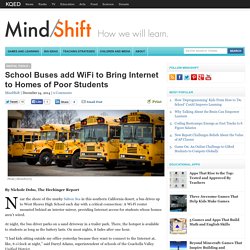
At night, the bus driver parks on a sand driveway in a trailer park. There, the hotspot is available to students as long as the battery lasts. On most nights, it fades after one hour. “I had kids sitting outside my office yesterday because they want to connect to the Internet at, like, 6 o’clock at night,” said Darryl Adams, superintendent of schools of the Coachella Valley Unified District. Unlike the wired and wealthy Silicon Valley in northern California, many homes in the former resort town, about 65 miles north of the Mexican border do not have high-speed Internet.
Teachers deserve public's support. Teachers' working conditions are students' learning conditions.
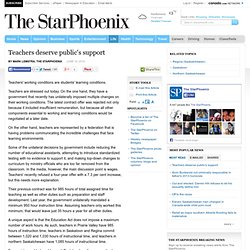
Teachers are stressed out today. On the one hand, they have a government that recently has unilaterally imposed multiple changes on their working conditions. The latest contract offer was rejected not only because it included insufficient remuneration, but because all other components essential to working and learning conditions would be negotiated at a later date. On the other hand, teachers are represented by a federation that is having problems communicating the incredible challenges that face learning environments. Some of the unilateral decisions by government include reducing the number of educational assistants, attempting to introduce standardized testing with no evidence to support it, and making top-down changes to curriculum by ministry officials who are too far removed from the classroom.
A unique aspect is that the Education Act does not impose a maximum number of work hours. Four points need to be addressed. Bringing The New Yorker to Life. The learning we will do during morning news sessions at Triangle Learning Community Middle School (TLC for short) will help students become “empathetic global citizens.”
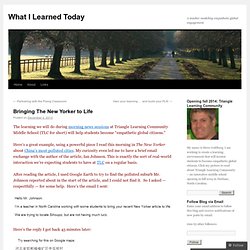
Here’s a great example, using a powerful piece I read this morning in The New Yorker about China’s most polluted cities. My curiosity even led me to have a brief email exchange with the author of the article, Ian Johnson. This is exactly the sort of real-world interaction we’re expecting students to have at TLC on a regular basis. After reading the article, I used Google Earth to try to find the polluted suburb Mr. Johnson reported about in the start of the article, and I could not find it.
Here’s the reply I got back 45 minutes later: First, thanks very much to Ian Johnson for replying to an email so promptly. Second, how did he type Chinese characters on email? And third, the second link that he sent worked! Can middle school students really handle writing from the New Yorker? The Top 10 Books For Professionals. “What I’ve learned about creating meaningful work” Working for yourself is scary stuff.
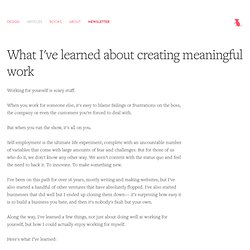
Consortium Points the Way on Proficiency-Based Learning - Getting Smart by Tom Vander Ark - Assessment, edchat, edleadership, edrefrom, education, proficiency-based learning. David Ruff is the executive director of the Great Schools Partnership and also coordinates the New England Secondary School Consortium (NESSC), a network of high schools in Connecticut, Maine, New Hampshire, Rhode Island, and Vermont.
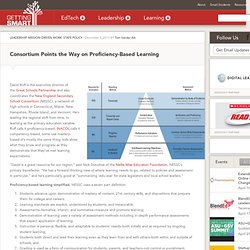
He’s leading the regional shift from time, to learning as the primary education variable. Reintroduce traditional textbooks in schools, minister says. Avoiding the "I-Know-Better-Than-You-Do" Syndrome. Leadership is getting someone to do what they don't want to do, to achieve what they want to achieve.
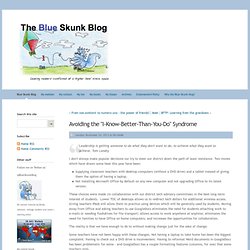
Tom Landry I don't always make popular decisions nor try to steer our district down the path of least resistance. Two moves which have drawn some heat this year have been: Supplying classroom teachers with desktop computers (without a DVD drive) and a tablet instead of giving them the option of having a laptop.Not installing Microsoft Office by default on any new computer and not upgrading Office to its latest version. The Sandbox Manifesto. I happily and honestly proclaim that everything I have learned about social media, I learned from children.

Children have no ulterior motives; they play authentically and transparently. In doing so, they place profound lessons in front of us. What should a school be? Nothing in the public debate on schooling suggests that education matters.
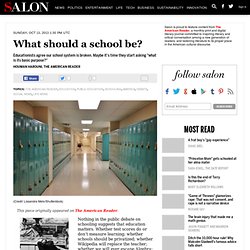
Whether test scores do or don’t measure learning; whether schools should be privatized; whether Wikipedia will replace the teacher; whether we will ever escape Algebra; whether we can measure the ways in which kids of color “fail” or “succeed” on exams; whether to teach like a “champion”, a “guide”, or a “pirate”; whether the arts are a right or a privilege: all these questions owe their importance to the system of schooling that turned them into questions in the first place. The entire debate keeps folding back onto itself. 'Afternoon naps' aid children's learning. 23 September 2013Last updated at 20:59 ET.
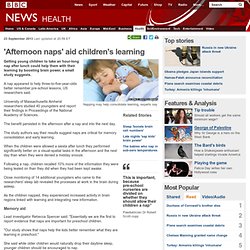
3 Creative Lessons From The Amateurs, Rebels, And Dreamers Of Outsider Subcultures. Some of the titular outsiders featured in Alissa Quart’s new book, Republic of Outsiders: The Power of Amateurs, Dreamers and Rebels, are crazy.
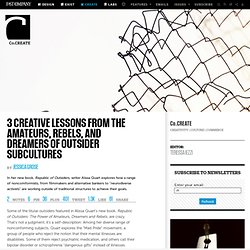
That’s not a judgment; it’s a self-description: Among her diverse range of nonconforming subjects, Quart explores the “Mad Pride” movement, a group of people who reject the notion that their mental illnesses are disabilities. Some of them reject psychiatric medication, and others call their bipolar disorder or schizophrenia “dangerous gifts” instead of illnesses. 5 Tips for Giving Really Amazing Presentations. A sure-fire plan for alienating employees — in just 6 easy steps! Research Blog Masters of New Media.